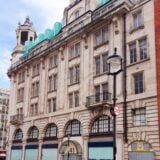The details will have to be disclosed in a public register, the first of its kind anywhere in the world, as part of Prime Minister David Cameron’s plan to clamp down on foreign money being ‘hidden’ in the UK.
It means that for the first time, foreign companies that already hold or want to buy property in the UK will be forced to reveal the details of who really owns them and no longer be able to hide behind a company vehicle.
It will include companies who already own property in the UK, not just those wishing to buy. Foreign companies own around 100,000 properties in England and Wales and over 44,000 of these are in London.
‘The new register for foreign companies will mean corrupt individuals and countries will no longer be able to move, launder and hide illicit funds through London’s property market, and will not benefit from our public funds,’ said Cameron.
He added that he would like to reverse the burden of proof so that someone suspected of using stolen money to buy property can be forced to prove they accumulated their wealth legitimately or they would face having the property taken away from them by a court.
France, the Netherlands, Nigeria and Afghanistan are set to follow the UK’s lead and commit introduce public registers of true company ownership, while Australia, New Zealand, Jordan, Indonesia, Ireland and Georgia have agreed to take the initial steps towards making similar arrangements.
The UK’s public register will be launched next month. However, details of how the measure will be implemented or whether there would be penalties for non-compliance have not yet been published.
Transparency International, the global group that fights against corruption in all walks of life, said the register was a bold step towards making it much harder for corrupt individuals to hide their money in UK real estate.
‘We strongly welcome the UK initiative to require full transparency of the companies who currently own or will purchase property in the UK, helping to close the door to corrupt cash,’ said Jose Ugaz, chair of Transparency International.
‘We welcome the fact that other countries also intend to shore up their own property markets so they don’t open the door to corrupt cash from overseas,’ Ugaz added.
According to international real estate firm Knight Frank less than 2% of residential property in London is owned by offshore companies. The firm’s head of London research, Tom Bill, believes that the move means that offshore trusts and companies will reassess their property holdings following the announcement of the ownership register, and some may decide to sell.
‘However, there is unlikely to be a wave of properties coming to the market. Offshore structures typically own other assets beyond property and evaluating how to manage a portfolio will be based on a series of complex and interlocking factors that may lead to a disposal or mean it is advantageous for the structure to remain in place,’ he said.
‘Furthermore, any decisions are likely to be delayed until the European Union referendum in June and, more importantly, many will wait until there is more clarity surrounding the removal next year of the inheritance tax exemption, the last major advantage for offshore companies buying property,’ he pointed out.
‘The second thing that is likely to happen is that more individuals will buy property in their own name, a trend that is being replicated around the world as the new global norm as international bodies like the OECD demand higher levels of transparency,’ he explained.
For the reasons given he does not believe that the ownership register is likely to have a material impact on demand for prime London property and said that the number of transactions that exclusively hinge on anonymity is likely to be small.
‘However, this change should be seen in the context of wider global initiatives and tax changes that will make owning prime property in key global hubs more complex and expensive,’ he added.




